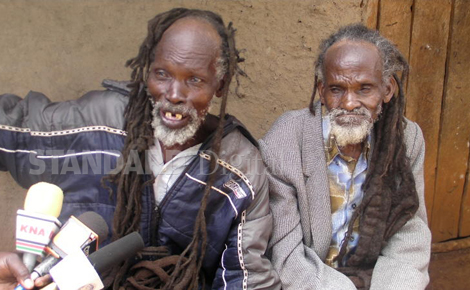×
The Standard e-Paper
Join Thousands Daily
 |
| Field Marshall Kavote (left) and General Sukuma at their home in Gichiche village, Embu County. The two had vowed never to shave their hair after leaving the forest at Kenya's independence. [PHOTO: MUNENE KAMAU/STANDARD] |
EMBU COUNTY: The last surviving freedom fighter among the three from Embu County who had vowed never to shave their hair after leaving the forest at Kenya’s independence has died.
Field Marshal Jacob Kavote passed away on Saturday at Embu Level Five Hospital, where he was receiving treatment for an undisclosed disease.